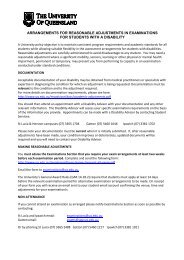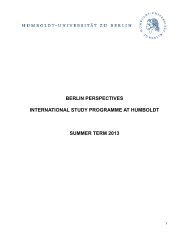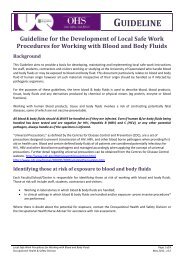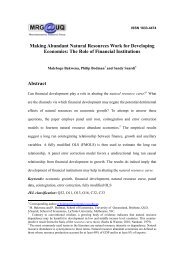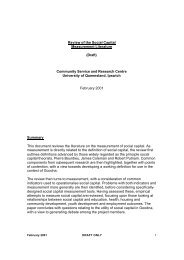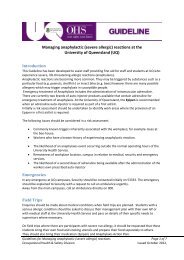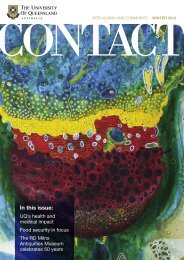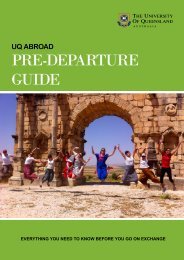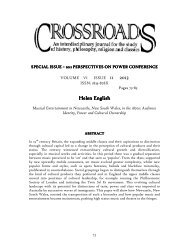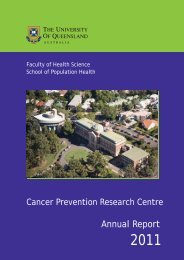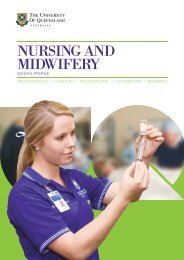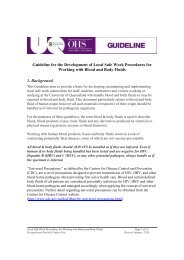Managing Traffic Incidents - University of Queensland
Managing Traffic Incidents - University of Queensland
Managing Traffic Incidents - University of Queensland
You also want an ePaper? Increase the reach of your titles
YUMPU automatically turns print PDFs into web optimized ePapers that Google loves.
The UK Multi-Modal Transport Studies<br />
– are there any ideas for Australian transport planning?<br />
Figure 1: Typical MMS Area<br />
Underinvestment in<br />
transport<br />
10 DECEMBER 2001<br />
by Stephen Luke, PPK Environment and Infrastructure, Brisbane Australia<br />
T<br />
Deprivation<br />
his article provides an overview <strong>of</strong><br />
the strategic Multi-Modal Transport<br />
Studies (MMS) currently underway<br />
in the UK and is based on research<br />
documents and UK publications and experience<br />
from an interurban multi modal transport study<br />
between London and Ipswich. The purpose <strong>of</strong><br />
this article is to identify and stimulate discussion<br />
about techniques and ideas which could be<br />
appropriate to Australasian transport planning<br />
practice.<br />
Multi Modal Studies – what are they?<br />
Transport issues are becoming increasingly important<br />
to economic prosperity and quality <strong>of</strong><br />
life. To plan for the future, the UK Government<br />
has commissioned a number <strong>of</strong> major transport<br />
studies throughout England. These are looking<br />
at current transport problems and issues, how<br />
these might change in the future, and what<br />
transport solutions might be found to best address<br />
them.<br />
The studies are large-scale regional studies<br />
and are very important since they collectively<br />
encompass a large part <strong>of</strong> England and are expected<br />
to address complex problems <strong>of</strong> transport,<br />
the economy and the environment.<br />
Figure 1 shows the study area for the MMS<br />
covering the south west <strong>of</strong> England from London<br />
to Cornwall. This particular region has a<br />
Links to South Wales<br />
Environmental<br />
Preservation<br />
Peripherality<br />
Population growth<br />
and Tourist <strong>Traffic</strong><br />
Links to Europe<br />
Economic<br />
growth<br />
Rurality<br />
number <strong>of</strong> transport problems including summer<br />
congestion on road and rail links, daily<br />
peak period congestion on key motorways, rail<br />
capacity constraints and infrequent rail services<br />
to some destinations. Air services provide only<br />
limited access to the national and world network.<br />
There are significant pockets <strong>of</strong> deprivation<br />
in some areas whilst other areas have very<br />
buoyant local economies. The region also suffers<br />
peripherality from the remainder <strong>of</strong> the UK<br />
and Europe. The south west <strong>of</strong> England also has<br />
very significant natural and built environmental<br />
assets that need to be protected.<br />
As the above example demonstrates, instead<br />
<strong>of</strong> focussing on a particular mode, MMS examine<br />
the role <strong>of</strong> each <strong>of</strong> the transport modes in<br />
the area or corridor concerned to identify the<br />
contribution that each can make to meeting objectives<br />
for the sustainable development <strong>of</strong> the<br />
region, area or corridor under consideration.<br />
Therefore MMS do not simply look at a congested<br />
or unsafe stretch <strong>of</strong> road to decide what<br />
improvements could be made, but will also examine<br />
what scope there is for expanding the<br />
role <strong>of</strong> public transport, or for using traffic<br />
management or other measures to manage the<br />
demand on the existing infrastructure, as well<br />
as other options improve the road in question.<br />
In most cases the solution is likely to be a<br />
combination <strong>of</strong> measures which together meet<br />
the national, local and regional objectives.<br />
The UK Department <strong>of</strong> Environmental,<br />
Transport and the<br />
Regions has drawn up guidance<br />
on the methodologies to be<br />
used when undertaking the<br />
MMS (GOMMS).<br />
The studies should identify<br />
transport and other policy options<br />
to cater for future demands<br />
and to assess the contri-<br />
Links to Europe<br />
butions which different modes<br />
<strong>of</strong> transport can make to meet<br />
future demands. These options<br />
could include:<br />
– Measures to make better use<br />
<strong>of</strong> existing transport infrastructure;<br />
Links to Midlands


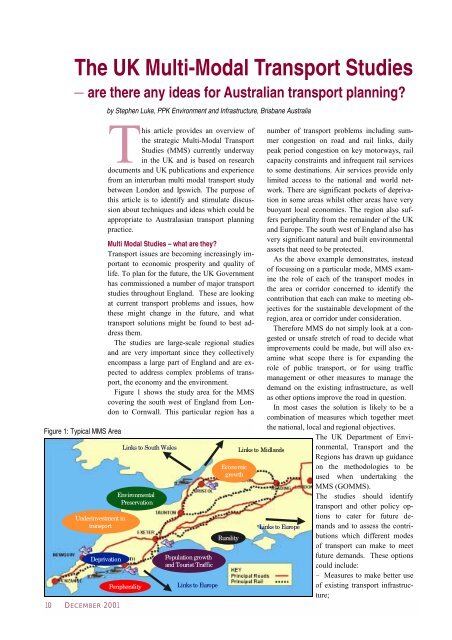
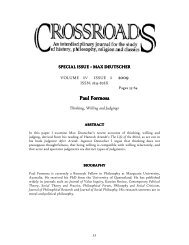
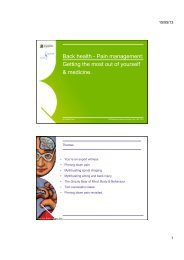
![Recycling [ PDF, 62KB ] - University of Queensland](https://img.yumpu.com/51805185/1/184x260/recycling-pdf-62kb-university-of-queensland.jpg?quality=85)
